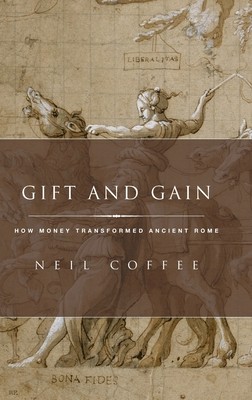
- We will send in 10–14 business days.
- Author: Neil Coffee
- Publisher: Oxford University Press, USA
- ISBN-10: 0190496436
- ISBN-13: 9780190496432
- Format: 16.3 x 23.6 x 3.1 cm, kieti viršeliai
- Language: English
- SAVE -10% with code: EXTRA
Reviews
Description
The economy of ancient Rome, with its long-range trade, widespread moneylending, and companies of government contractors, was surprisingly modern. Yet Romans also exchanged goods and services within a traditional system of gifts and favors, which sustained the supportive relationships necessary for survival in the absence of extensive state and social institutions. In Gift and Gain: How Money Transformed Ancient Rome, Neil Coffee shows how a vibrant commercial culture progressively displaced systems of gift giving over the course of Rome's classical era. The change was propelled by the Roman elite, through their engagement in a variety of profit-making enterprises. Members of the same elite, however, remained habituated to traditional gift relationships, relying on them to exercise influence and build their social worlds. They resisted the transformation, through legislation, political movements, and philosophical argument. The result was a recurring clash across the contexts of
Roman social and economic life.
EXTRA 10 % discount with code: EXTRA
The promotion ends in 21d.14:55:14
The discount code is valid when purchasing from 10 €. Discounts do not stack.
- Author: Neil Coffee
- Publisher: Oxford University Press, USA
- ISBN-10: 0190496436
- ISBN-13: 9780190496432
- Format: 16.3 x 23.6 x 3.1 cm, kieti viršeliai
- Language: English English
The economy of ancient Rome, with its long-range trade, widespread moneylending, and companies of government contractors, was surprisingly modern. Yet Romans also exchanged goods and services within a traditional system of gifts and favors, which sustained the supportive relationships necessary for survival in the absence of extensive state and social institutions. In Gift and Gain: How Money Transformed Ancient Rome, Neil Coffee shows how a vibrant commercial culture progressively displaced systems of gift giving over the course of Rome's classical era. The change was propelled by the Roman elite, through their engagement in a variety of profit-making enterprises. Members of the same elite, however, remained habituated to traditional gift relationships, relying on them to exercise influence and build their social worlds. They resisted the transformation, through legislation, political movements, and philosophical argument. The result was a recurring clash across the contexts of
Roman social and economic life.


Reviews